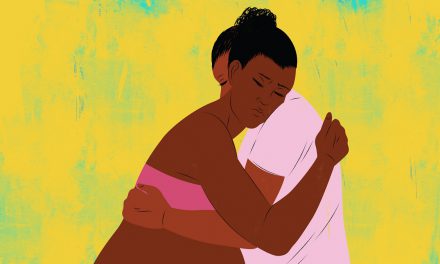By Elena Cleaves
The national mortality rate for Black women nearly doubles that of other races. In 2018 the CDC found 37.1 deaths per 100,000 live births for Black women compared to 14.7 deaths for non-Hispanic white women and 11.8 for Hispanic women. According to Netta Thompson, Chief Operating Officer (COO) at Uzazi Village, Black maternal mortality rates are similarly high here in Kansas City as Black moms die four to five times more frequently than their white peers. For every thousand births, 9.1 Black infants will die before their first birthday, compared with 2.1 of white infants.
Uzazi Village is a nonprofit dedicated to improving health inequities in the community located on Troost Avenue in Kansas City. Uzazi provides care, support, and educational services for women including several resources for pregnancy and childbirth with a focus on overcoming the unique health care challenges Black and Brown women face. Through her experience as COO and as a Certified Breastfeeding Educator, Thompson believes the factors contributing to significantly higher maternal and infant mortality rates for women of color include medical racism, insufficient community resources, and a lack of patient advocacy.
Implicit and Systemic Racism in Health Care
Implicit racial bias in individuals and systemic racism throughout the health care industry both play a role in affecting Black women receiving the medical care they need, especially throughout pregnancy and childbirth. Racial stereotypes, an example of implicit bias, are a product of both ignorance and lack of exposure. While white providers may not necessarily have hateful prejudices, if they have had little exposure to different races, ethnicities, or cultures, they may be operating solely on the education they receive which may be problematic.
“Considering that some of our current OB procedures were practiced on Black bodies without their permission, without any type of anesthesia, the belief that Black bodies are tougher and stronger and don’t need pain medication – I believe that that is still being passed down in these medical facilities when they’re training their new staff and interns,” Thompson says. “Absolutely they do not listen to Black bodies…and that affects the care that they receive.”
Systemic racism, or the systems within an institution which perpetuate racial injustice, is rampant in the health care industry, even in the education medical providers receive. According to Taking Black Pain Seriously, “Myths, disparities, and pervasive systemic inequities in health care have fostered bias and distorted perceptions of Black people’s pain, leading to catastrophic outcomes.” The article cites studies detailing the history of Black patients receiving worse care than their white counterparts due to beliefs by medical providers that they have a higher pain tolerance and thicker skin, commonly believed myths that can be sourced back to slave owners.
Because of these racist beliefs, Black women are frequently not taken seriously by their care providers. Tennis champion Serena Williams made headlines when she spoke up about her pregnancy experience, when she expressed concern to her nurse about shortness of breath and her fear of having a pulmonary embolism, only to be dismissed. She repeatedly spoke up to her team about feeling like something was off until they finally listened, only to discover serious blood clots in her lungs which created further complications. The providers’ refusal to take Williams’ concerns seriously has since become an example of the Black maternal experience in America.
Thompson warns about the tangible ways racism shows up, from microaggressions to blatant gaslighting, and the importance of patient advocacy when caring for Black women. She recalls the experience of a client who was sent home from a local hospital after a C-section with only Tylenol, despite repeatedly asking for a stronger pain medication. “It took them so long to finally go ahead and give her the prescription. That’s a major abdominal surgery and she had already been at home for several days before she finally received the prescription, she needed to be able to handle her pain.”
“I think that stems from their own internal biases about how Black people are and what they have allowed to influence them on how they treat Black people.” However, she warns, many feel that it’s a losing battle because standing up to their providers could label them as a difficult patient and lead to even more issues. She uses Williams as an example – “She got that airplay time because she’s famous – how many Black women who are not famous went through the same thing she did and lost their lives because the physicians didn’t want to listen?”
Implicit bias may present itself more subtly, such as white patients automatically receiving nicer rooms and more attentive nursing staff, according to Thompson. Black babies are also frequently born smaller but otherwise healthy, leading white providers to incorrectly assume a health issue and place the infant in NICU away from the mother. Racially stereotyped assumptions may even go unnoticed by the patient and family, such as the example she provides of social workers “checking in” on suspicion of drug activity. Social workers will go to extremes based on these suspicions, including testing the urine of mothers and the diapers of their babies to look for traces of drug use without the family’s knowledge. However, Black and Brown families are almost exclusively the ones assumed to be drug users, despite meth use among white families in the area.
Some verbal microaggressions, such as referring to a Black patient and her husband as “girl and boy,” can also contribute to a hostile environment. Infantilizing Black people has a racist history specifically focused on creating an imbalanced power dynamic, which can strip a patient of their sense of agency when already under the control and care of their provider. Women may not feel comfortable standing up for themselves if they are not even being treated or talked to as a grown adult. Thompson recalls an experience where a Black man was referred to as the “baby daddy” instead of as the father or husband. How are families supposed to trust their providers to make decisions in their best interest when they show prejudice even within their introductions?
Education and Advocacy for Black Mothers
Black mothers and mothers-to-be can prepare themselves for a better health care experience through self-education and research. Thompson recommends Black women who are pregnant or planning to have children take the following steps to set themselves up for success:
- Get a doula if possible. Doulas act as a conduit between patients and providers, can translate complicated jargon or procedures, explain informed consent, and advocate for the patient if they disagree with the provider or feel uncomfortable.
- Research hospitals and other care facilities. Most hospitals have ratings and reviews available online and some offer tours (though they may not be currently due to COVID-19). Uzazi’s Facebook page features a free 29-page report on local hospitals and their treatment of Black and Brown patients.
- Try to have a birthing plan ready before finding a provider. Having a strong sense of what you want and are comfortable with will help you advocate for yourself as you can address any concerns or obstacles with providers early on. Shop around for physicians, don’t settle on the first one, and don’t settle on only one.
- Know your rights as a patient. You are allowed to request new doctors, nurses, and other hospital staff and you are allowed to speak up if you are uncomfortable. Don’t be afraid to ask questions and hold providers’ feet to the fire.
- Talk to other moms about their experiences with certain hospitals, physicians, procedures, and more.
- Have at least one person by your side. Talk to your loved ones about your concerns and find someone who understands and respects your preferences to accompany you and advocate for you if necessary. It’s important to be able to stand up for yourself but having a partner or family member to support you can provide comfort during stressful experiences.
One unique challenge Black women face as mothers is the disagreement on breastfeeding within the Black community. According to Thompson, breastfeeding is a controversial issue stemming from slavery when Black mothers were forced to nurse slave masters’ babies, leaving them unable to feed their own children – yet another factor contributing to a long history of high Black infant mortality rates. While there has been a bigger push recently to break down stigmas surrounding breastfeeding, older generations of Black women still show some hesitancy which can create challenges for younger Black women making decisions around their own pregnancy and childcare.
Self-education and advocacy are crucial for Black women seeking health care, but they have bore the weight of responsibility for far too long. White health care providers must start advocating for Black patients more than anyone else, especially the young medical students Thompson says are “afraid of rocking the boat.” As intimidated as white students may be to stand up to their supervisors, the fear is undeniably worse for their Black and Brown peers. White medical providers at all levels, from students to residents and in between, must fight against racial injustice they witness, be it a snide comment during a huddle or an outright refusal to believe a patient.
Thompson stresses that while we may collectively acknowledge that racism exists in health care, we often forget that the people creating racist myths and conducting horrific experiments such as Tuskegee trained others in the field who may have passed down those biases to other professionals today. Structural cycles of racism must be broken and Black people cannot continue to be expected to put their lives on the line. Thompson mentions a frequent excuse is “this is how we’ve always done things” – but they can’t continue to be done this way anymore. Black women and babies are dying at twice the rate of other races. Racism is a health crisis and it is young, white providers’ responsibility to lead the charge to fix it.
Uzazi Village offers a curriculum called Culturally Congruent Care, a program that pairs providers of different races together to talk about the experience Black and Brown people face in health care and helps teach white providers about why Black people inherently don’t trust physicians. Thompson recommends white providers especially continue to educate themselves outside of the program as well. “The medical field, the things it has done to the Black community — they have not even begun to address it or unpack that,” Thompson says. “Until they can sit in that, acknowledge what they did, apologize for it, and then make the necessary changes, you’re still going to have that bit of distrust between the two.”
Local Services for Black and Brown Women
Uzazi offers several services and resources for women in the KCMO area as well as education and training for both clients and providers. All services are currently appointment only due to COVID-19 precautions and can be scheduled over the phone. Uzazi is currently in the process of updating their website; information and updates can be found on their Facebook page.
- Diaper depot: free diapers, wipes, and formula available. First and third Wednesday of the month at the Missouri location, call 816.541.3718 to schedule. Second and fourth Wednesday at the Kansas location, call 913.980.2779 to schedule.
- Free breastfeeding clinic: free pumps and bras also provided.
- Walk-in clothing closet: fill a bag from bins of clothing and more including items for children.
- Doula services: clients can call and speak to a program director to request a doula and will be provided an intake form. Services will either be free or on a sliding scale. A bilingual doula available at the Kansas location.
- Bilingual doula for translation services. (Spanish only. Not taking doula clients.)
- Free COVID-19 testing clinic: Mondays and Thursdays from 3 p.m. to 6 p.m. at the Missouri location only. Call 816.882.6488 to schedule.








